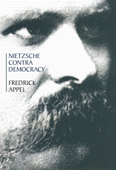 A book showcasing Friedrich Nietzsche's anti-democratic thought: "Nietzsche Contra Democracy" by Fredrick Appel (Cornell University Press, 1999).
A book showcasing Friedrich Nietzsche's anti-democratic thought: "Nietzsche Contra Democracy" by Fredrick Appel (Cornell University Press, 1999).Publisher's description: "Apolitical, amoral, an aesthete whose writings point toward some form of liberation: this is the figure who emerges from most recent scholarship on Friedrich Nietzsche. The Nietzsche whom Fredrick Appel portrays is of an altogether different character, one whose philosophical position is inseparable from a deep commitment to a hierarchical politics. Nietzsche contra Democracy gives us a thinker who, disdainful of the 'petty politics' of his time, attempts to lay the normative foundations for a modern political alternative to democracy. Appel shows how Nietzsche's writings evoke the prospect of a culturally revitalized Europe in which the herdlike majority and its values are put in their proper place: under the control of a new, self-aware, and thoroughly modern aristocratic caste whose sole concern is its own flourishing.
"In chapters devoted to Nietzsche's little discussed views on solitude, friendship, sociability, families, and breeding, this book brings Nietzsche into conversation with Aristotelian and Stoic strains of thought. More than a healthy jolt to Nietzsche scholarship, Nietzsche contra Democracy also challenges political theory to articulate and defend the moral consensus undergirding democracy."
www.cornellpress.cornell.edu/cup_detail.taf?ti_id=3083
Reviews: "From the opening words of this new book on Nietzsche's political philosophy, we know we are in the hands of a capable scholar: 'Friedrich Nietzsche's great concern is for the flourishing of those few whom he considers exemplary of the human species.' Appel's book demonstrates, from start to finish, the economy and lucidity found in this pithy statement. [...] He laces together textual evidence and strong arguments to make his case, to my mind incontrovertibly, that Nietzsche's opposition to liberal and egalitarian political ideas ... was unvarying." (Philip R. Munger, "The Boston Book Review")
"Fredrick Appel offers a thorough and devastating critique of what he calls the 'new orthodoxy' about Nietzsche which dominates contemporary scholarship. Appel [...] demonstrates how much scholars have to distort Nietzsche's writings to turn him into an enemy of social hierarchy and domination". (Bernard Yack, University of Wisconsin, Madison)
"[A] brilliant piece of scholarship, both clearly written and well argued, or if you prefer, both lucid and logical." (David A. Gugin, "Perspectives on Political Science")
The book is fully searchable on Google Book Search (including table of contents):
http://books.google.com/books?id=My2-0mPc9cAC&printsec=frontcover
Fredrick Appel is Senior Editor at Princeton University Press. He appears not to have published since – neither books nor articles.





No comments:
Post a Comment